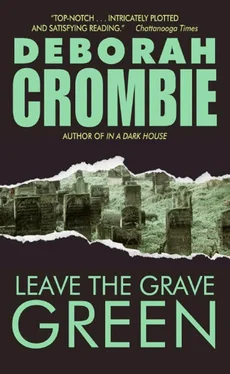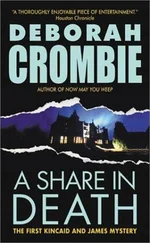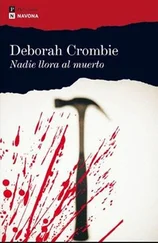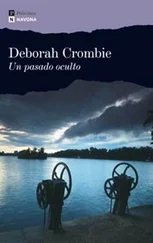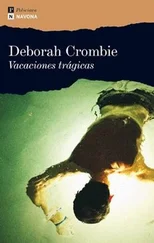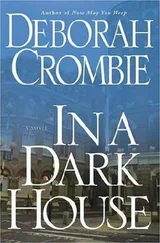Deborah Crombie - Leave The Grave Green
Здесь есть возможность читать онлайн «Deborah Crombie - Leave The Grave Green» весь текст электронной книги совершенно бесплатно (целиком полную версию без сокращений). В некоторых случаях можно слушать аудио, скачать через торрент в формате fb2 и присутствует краткое содержание. Жанр: Детектив, на английском языке. Описание произведения, (предисловие) а так же отзывы посетителей доступны на портале библиотеки ЛибКат.
- Название:Leave The Grave Green
- Автор:
- Жанр:
- Год:неизвестен
- ISBN:нет данных
- Рейтинг книги:5 / 5. Голосов: 1
-
Избранное:Добавить в избранное
- Отзывы:
-
Ваша оценка:
- 100
- 1
- 2
- 3
- 4
- 5
Leave The Grave Green: краткое содержание, описание и аннотация
Предлагаем к чтению аннотацию, описание, краткое содержание или предисловие (зависит от того, что написал сам автор книги «Leave The Grave Green»). Если вы не нашли необходимую информацию о книге — напишите в комментариях, мы постараемся отыскать её.
Leave The Grave Green — читать онлайн бесплатно полную книгу (весь текст) целиком
Ниже представлен текст книги, разбитый по страницам. Система сохранения места последней прочитанной страницы, позволяет с удобством читать онлайн бесплатно книгу «Leave The Grave Green», без необходимости каждый раз заново искать на чём Вы остановились. Поставьте закладку, и сможете в любой момент перейти на страницу, на которой закончили чтение.
Интервал:
Закладка:
A passerby stopped and peered at the painting in the window, as had several others since Kincaid had come into the gallery. Beyond her the light had shifted, and the shadows of the willows lay longer on the pavement. “They don’t come in,” Kincaid said as he watched her move toward the tea shop and pass from his view.
“No. Not often.” Simons gestured at the paintings lining the walls. “The prices are a bit steep for impulse buying. Most of my customers are regulars, collectors. Though sometimes one of those window-shoppers will wander in and fall in love with a painting, then go home and save up pennies out of the housekeeping or the beer money until they have enough to buy it.” He smiled. “Those are the best, the ones that know nothing about art and buy out of love. It’s a genuine response.”
Kincaid looked at the illuminated painting of the girl in the meadow, her eyes gently closed, her faintly freckled face tilted to the sun, and acknowledged his own experience. “Yes, I can see that.”
He stood and regarded Trevor Simons, who, whatever his sins, seemed a perceptive and decent man. “A word of advice, Mr. Simons, which I probably shouldn’t give. An investigation like this moves out in ripples-the longer it takes the wider the circle becomes. If I were you I’d do some damage control-tell your wife about Julia if you can. Before we do.”
Kincaid sat at the table nearest the window in the tea shop. The tin pot had leaked as he poured, and his cup sat in a wet ring on the speckled plastic tabletop. At the next table he recognized the woman who had stopped at the gallery window a few minutes before-middle-aged, heavyset, her graying hair tightly crimped. Although the air in the shop was warm enough to form faint steamy smudges on the windowpanes, she still wore a waterproof jacket over her bulky cardigan. Perhaps she feared it might rain unexpectedly inside? When she looked up, he smiled at her, but she looked away, her face frozen in an expression of faint disapproval.
Gazing idly at the river again, he fingered the key in his trouser pocket. Gemma had acquired Connor’s key, address and a description of the property from Thames Valley along with the initial reports. Until a year ago Julia and Connor had lived together in the flat he thought must be just along the terrace, near the willow-covered islands he could see from the window. Julia might have stopped in here often for a morning coffee or a cup of afternoon tea. He imagined her suddenly, sitting across the booth from him in a black sweater, smoking jerkily, frowning in concentration. In his mind she rose and went out into the street. She stood before the gallery for a moment, as if hesitating, then he heard the door chime as she opened it and went in.
Shaking his head, Kincaid downed the remains of his tea in one gulp. He slid from the booth and presented his soggy bill to the girl behind the counter, then followed Julia’s phantom out into the lengthening shadows.
He walked toward the river meadows, gazing alternately at the placid river on his left and the blocks of flats on his right. It surprised him that these riverside addresses weren’t more elegant. One of the larger buildings was neo-Georgian, another Tudoresque, and both were just a trifle seedy, like dowagers out in soiled housecoats. The shrubbery grew rankly in the gardens, brightened only by the dark red dried heads of sedum and the occasional pale blue of Michaelmas daisies. But it was November after all, Kincaid thought charitably, looking at the quiet river. Even the kiosk advertising river trips and boats for hire was shuttered and locked.
The road narrowed and the large blocks of flats gave way to lower buildings and an occasional detached house. Here the river seemed less separate from the land, and when he reached the high black wrought-iron fence he recognized it from the scrawled description in his pocket. He grasped two of the spiked bars in his hands and peered through them. A commemorative ceramic plaque set into the wall of the nearest building informed him that the flats were quite recently developed, so perhaps Julia and Connor had been among the first tenants. They were built to look like boathouses, in a soft-red brick with an abundance of white-trimmed windows, white deck railings and white peaked gables adorned with gingerbread. Kincaid thought them a bit overdone, but pleasantly so, for they harmonized with both the natural landscape and the surrounding buildings. Like Prince Charles, he found most contemporary architecture to be a blight upon the landscape.
Dodging an array of parked boats and trailers, Kincaid walked along the fence until he found a gate. The flats were staggered behind a well-tended garden, and none was quite identical to the next. He found the house easily, one of the three-tiered variety, raised above the ground on stiltlike supports. Feeling suddenly as if he were trespassing, he fitted the key in the lock, but no one called out to him from the adjacent decks.
He had expected black and white.
Illogically, he supposed, considering the intensity of color Julia used in her paintings. This was a softer palette, almost Mediterranean, with pale yellow walls and terra-cotta floors. Casually provincial furniture filled the sitting room and a fringed Moroccan rug softened the tile floor. On a tiled platform against one wall stood an enameled wood-burning stove. A small painted table in front of the sofa held a chess set. Had Connor played, Kincaid wondered, or had it been merely for show?
A sport jacket lay crumpled over the back of a chair, an untidy pile of newspapers spilled from sofa to floor and a pair of boat shoes peeked from beneath the coffee table. The male clutter seemed incongruous, an intrusion on an essentially feminine room. Kincaid ran his forefinger across a tabletop, then brushed off the resulting gray fuzz against his trouser leg. Connor Swann had not been much of a housekeeper.
Kincaid wandered into the adjoining kitchen. It had no windows, but opened to the sitting room with its view of the river. Unlike the sitting room, however, it looked immaculate. Cans of olive oil and colored-glass bottles of vinegar stood out like bright flags against the oak cabinets and yellow countertops, and a shelf near the cooktop held an array of well-thumbed cookbooks. Julia Child , read Kincaid, The Art of Cooking. The Italian Kitchen. La Cucina Fresca . There were more, some with lavish color photographs that made him hungry just looking. Glass jars filled with pasta lined another open shelf.
Kincaid opened the fridge and found it well stocked with condiments, cheeses, eggs and milk. The freezer held a few neatly wrapped and labeled packages of meat and chicken, a loaf of French bread, and some plastic containers of something Kincaid guessed might be homemade soup stock. A pad beneath the telephone held the beginnings of a grocery list: aubergines , tomato paste, red-leaf lettuce, pears .
The descriptions Kincaid had heard of Connor Swann had not led him to expect an accomplished and enthusiastic cook, but this man had obviously not resorted to zapping frozen dinners in the microwave.
The first floor held a master bedroom and bath done in the same soft yellows as the ground floor, and a small room which apparently served as an office or study. Kincaid continued up the stairs to the top floor.
It had been Julia’s studio. The wide windows let in a flood of late afternoon light, and over the willow-tops he could see the winding Thames. A bare table stood in the center of the room, and an old desk pushed against one wall held some partially used sketch pads and a wooden box filled with odds and ends of paint tubes. Curiously, Kincaid rummaged through them. He hadn’t known that professional watercolors came in tubes. Windsor Red. Scarlet Lake. Ultramarine Blue . The names ran through his mind like poetry, but the tubes left the fine dust of neglect on his fingertips. The room itself felt empty and unused.
Читать дальшеИнтервал:
Закладка:
Похожие книги на «Leave The Grave Green»
Представляем Вашему вниманию похожие книги на «Leave The Grave Green» списком для выбора. Мы отобрали схожую по названию и смыслу литературу в надежде предоставить читателям больше вариантов отыскать новые, интересные, ещё непрочитанные произведения.
Обсуждение, отзывы о книге «Leave The Grave Green» и просто собственные мнения читателей. Оставьте ваши комментарии, напишите, что Вы думаете о произведении, его смысле или главных героях. Укажите что конкретно понравилось, а что нет, и почему Вы так считаете.
